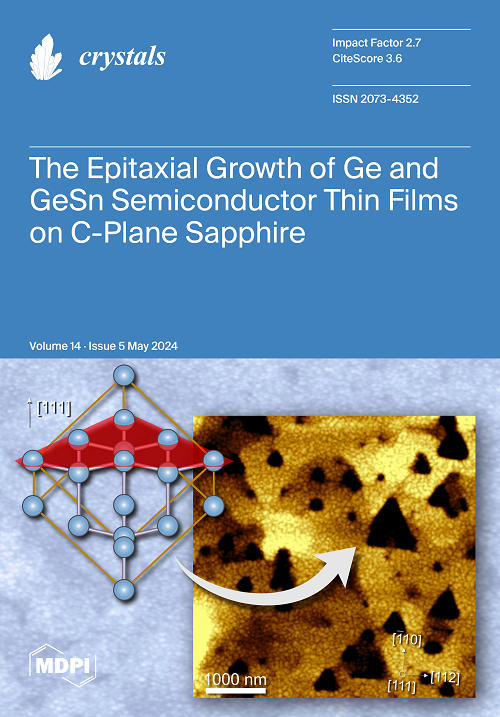利用化学气相沉积法制造掺铁硒化物薄片并确定其特性
IF 2.4
4区 材料科学
Q2 CRYSTALLOGRAPHY
引用次数: 0
摘要
二维(2D)材料因其独特的性能和在先进电子领域的潜在应用而备受关注。本研究采用优化的化学气相沉积(CVD)方法,研究了掺杂铁的 SnSe 半导体的制备和表征。在去离子水中溶解FeCl3,将其涂在SnSe粉末上,然后进行真空干燥,接着在820 ℃下进行高温化学气相沉积,从而实现了铁的掺杂。利用光学显微镜、扫描电子显微镜(SEM)和能量色散 X 射线光谱(EDX)对其结构和形态特性进行了表征。结果表明,受铁含量的影响,薄片的形状各不相同,包括矩形、圆盘形和线形。显微拉曼光谱显示出明显的振动模式移动,表明结构发生了变化。X 射线光电子能谱 (XPS) 证实了 Sn-Se 和 Fe-Se 键的存在。这些研究结果表明,掺杂铁的硒化锡是一种很有前途的材料,可用于非易失性存储器和神经形态计算应用。本文章由计算机程序翻译,如有差异,请以英文原文为准。
Fabrication and Characterization of Fe-Doped SnSe Flakes Using Chemical Vapor Deposition
The development of two-dimensional (2D) materials has gained significant attention due to their unique properties and potential applications in advanced electronics. This study investigates the fabrication and characterization of Fe-doped SnSe semiconductors using an optimized chemical vapor deposition (CVD) method. Fe doping was achieved by dissolving FeCl3 in deionized water, applying it to SnSe powder, and conducting vacuum drying followed by high-temperature CVD at 820 °C. Structural and morphological properties were characterized using optical microscopy, scanning electron microscopy (SEM), and energy dispersive X-ray spectroscopy (EDX). Results revealed differently shaped flakes, including rectangles, discs and wires, influenced by Fe content. Micro-Raman spectroscopy showed significant vibrational mode shifts, indicating structural changes. X-ray photoelectron spectroscopy (XPS) confirmed the presence of Sn-Se and Fe-Se bonds. Electrical characterization of the memristive devices showed stable switching between high- and low-resistance states, with a threshold voltage of 1.6 V. These findings suggest that Fe-doped SnSe is a promising material for non-volatile memory and neuromorphic computing applications.
求助全文
通过发布文献求助,成功后即可免费获取论文全文。
去求助
来源期刊

Crystals
CRYSTALLOGRAPHYMATERIALS SCIENCE, MULTIDIS-MATERIALS SCIENCE, MULTIDISCIPLINARY
CiteScore
4.20
自引率
11.10%
发文量
1527
审稿时长
16.12 days
期刊介绍:
Crystals (ISSN 2073-4352) is an open access journal that covers all aspects of crystalline material research. Crystals can act as a reference, and as a publication resource, to the community. It publishes reviews, regular research articles, and short communications. Our aim is to encourage scientists to publish their experimental and theoretical results in as much detail as possible. Therefore, there is no restriction on article length. Full experimental details must be provided to enable the results to be reproduced. Crystals provides a forum for the advancement of our understanding of the nucleation, growth, processing, and characterization of crystalline materials. Their mechanical, chemical, electronic, magnetic, and optical properties, and their diverse applications, are all considered to be of importance.
 求助内容:
求助内容: 应助结果提醒方式:
应助结果提醒方式:


